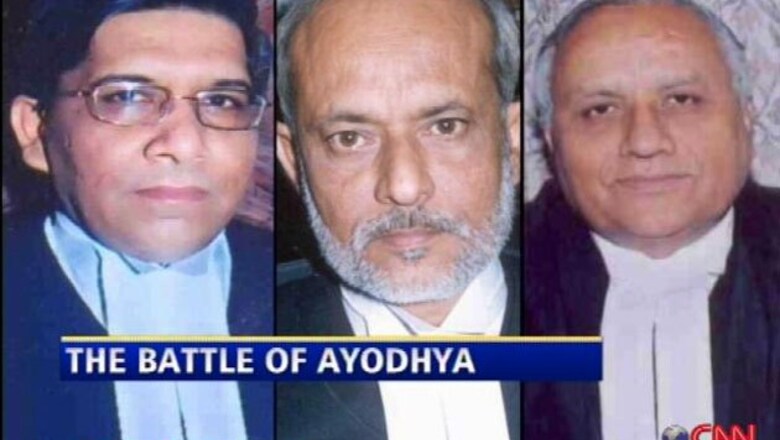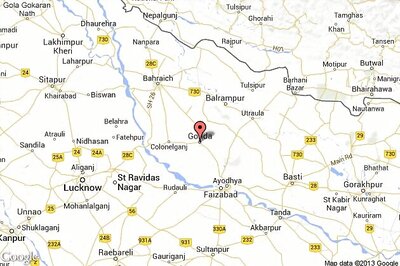
views
Lucknow: With all eyes riveted on the three judges who pronounced the Ayodhya verdict on Thursday, their life away from the court offered some interesting insight with one of them having a reputation of being as good as with the ladle as he is with the gavel.
Justice Dharam Veer Sharma, the senior-most judge on the
Lucknow bench of the Allahabad High Court who demits office
On Friday, cooks his own food and occasionally makes a meal for his colleagues, according to veteran advocates.
The other two judges on the special Ayodhya bench hearing the country's longest running legal dispute are Justice Sudhir Agarwal and Justice Sibghat Ullah Khan.
In the tense build up to Thursday's verdict, Sharma, a deeply religious man who mostly sticks to Hindi, was in the spotlight for two reasons.
He had sprung a surprise with his dissenting verdict on
September 20 and pitched for mediation when the High Court rejected a plea for deferment of the keenly awaited verdict in the 60-year-old dispute to explore the possibility of any out-of-court settlement.
And the fact that he demits office tomorrow was highlighted by the parties to the title suit who did not want the judgment to be postponed.
Colleagues of Sharma, a strict vegetarian and a bachelor, speak of his austere lifestyle as he has been seen in white dhoti-kurta at social functions.
The judge is also known to have a human face and he goes out of his way to help poor petitioners. He is famous for his philanthropic nature and is known to have helped many in times of crisis.
Born on October 2, 1948, Sharma graduated in arts in
1967 and got his law degree in 1970 from a college in Bulandshahr in Uttar Pradesh. In 1972, he got through the judicial service to become a district court judge.
In 2002, he became district and sessions judge and joined the Lucknow bench of the high court in 2005. Sharma was nominated as a judge of the Ayodhya bench on February 12, 2007.
Justice Agarwal at 52 is the youngest of the three judges on the Ayodhya bench. Unlike his senior judge Justice Sharma in the bench, Justice Agarwal is mostly heard speaking in English even outside the courtroom.
He is known for his incisive and precise judgments and always plays by the law book, according to a junior who worked under the judge when he was an advocate. The judge was also described as extremely articulate and well versed with nuances of civil law.
Another advocate said that Justice Agarwal's verdicts are marked by earthy level wisdom and rarely contradicted by the Supreme Court.
Agarwal graduated with science from Agra University in 1977, then studied law at Meerut University, earning his degree in 1980. He joined the Allahabad High Court Bar in October the same year. Starting out as a tax advocate, he later shifted to service laws.
Born on April 25, 1958, Justice Agarwal's retirement is due on April 23, 2020. He joined the Allahabad High Court Bench in October 2005 and was confirmed as a permanent judge in August 2007.
Justice Khan, the third member of the Bench, is also a science graduate like Justice Agarwal and both of them were colleagues in the High Court Bar.
Known for his razor sharp wit, Justice Khan, 58, has always been aided by a strong sense of history, according to advocate D P Gupta. He earned his law degree from Aligarh Muslim University in 1975 and enrolled himself as an advocate the same year.
He specialised in the civil, service and revenue areas of law for 25 years before being elevated as permanent judge of Allahabad High Court in 2002.
A law officer said there are many verdicts of Justice Khan in the AIR Law Books, which are milestones in civil disputes. The All India Reporter law books report judgments of the Supreme Court and the High Courts. Khan, who is equally at ease in Hindi and English, is known to push for out-of-court settlements of civil cases, and he is said to have settled 2,000 cases through negotiations.
Born on January 31, 1952, Justice Khan will reach the age of retirement on January 30, 2014. Justice Khan, who sat on the Ayodhya Bench for the first time on January 11, 2010, is known to be a tough judge who remains firm in his approach.
















Comments
0 comment